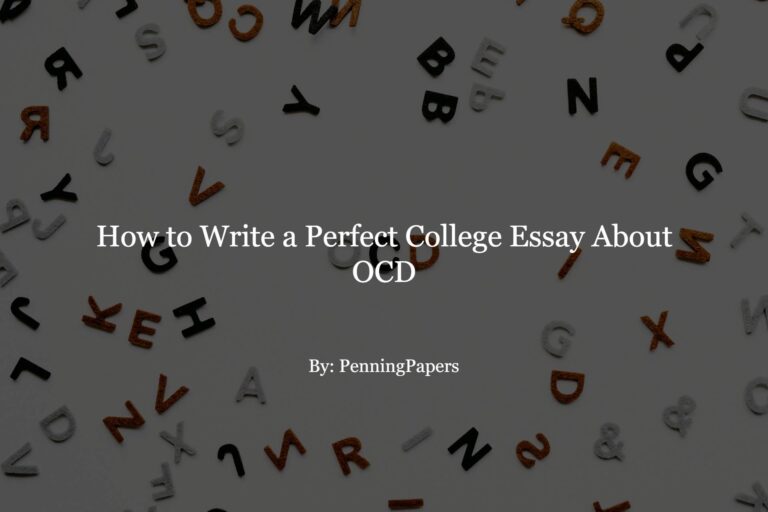The “perfect” college essay about OCD: it doesn’t exist.
Yet, somehow, in the back of our minds, we have a gnawing perfectionistic demon that can’t accept it. We’re not willing to accept that our essay can’t be perfect. We can’t!
Isn’t that ironic?
A guide on writing your college essay about OCD, telling you that perfectionism is impossible.
Now, here’s the truth: Yes, you can write about OCD in your college essay. You can also talk about its negative impacts on your life (with limits). But, to write the perfect college essay about OCD, you need to suspend the illusion of perfection.
Now, we’re going to explain this more in depth below. This guide is going to cover quite a few points, as writing about OCD is a bit complicated.
So, grab some popcorn —or whatever your preferred choice of snack is. Let’s get to the guide step-by-step!
Table of Contents
- OCD is a Stronger College Essay Topic Than You May Think.
- You Can’t Talk About EVERYTHING.
- Suspend the Illusion of Control.
- Consider Nuances to OCD That Neurotypicals are Blind to.
- At the End of the Day, the Essay is About You and Your Strengths.
- Unpopular Opinion: You Can Be Positive and Cover Sad Topics at the Same Time!
- College Essay About OCD Example.
Professional College Application Help.
Contact us. We'll get to you within 24 hours.
OCD is a Stronger College Essay Topic Than You May Think.

Just to clarify, let’s get definitions out of the way. Psychiatry.org defines OCD well. We’ve paraphrased it below for brevity.
“Obsessive-compulsive disorder (OCD) is a disorder in which people have recurring, unwanted thoughts, ideas or sensations (obsessions). To get rid of the thoughts, they feel driven to do something repetitively (compulsions). The repetitive behaviors, such as hand washing/cleaning, checking on things, and mental acts like (counting) or other activities, can significantly interfere with a person’s daily activities and social interactions.
…For people with OCD, thoughts are persistent and intrusive, and behaviors are rigid. Not performing the behaviors commonly causes great distress, often attached to a specific fear of dire consequences (to self or loved ones) if the behaviors are not completed. Many people with OCD know or suspect their obsessional thoughts are not realistic… Even if they know their intrusive thoughts are not realistic, people with OCD have difficulty disengaging…
…A diagnosis of OCD requires the presence of obsessional thoughts and/or compulsions that are time-consuming (more than one hour a day), cause significant distress, and impair work or social functioning…”
Source: Psychiatry.org Defining OCD
Okay so what makes OCD a strong essay topic? Well, it’s versatile.
In OCD, there are a lot of ways your condition can impact everyday life. This condition often has a snowballing effect on other aspects of your life. But, how one person experiences OCD may be different from another. This gives every OCD applicant unique in their own background and experiences.
In addition, OCD is a very complex mental condition to cope with. It’s not easy to compensate for OCD without getting oneself in a twist. Coming up with ways to cope with your condition can demonstrate resilience, dedication, creativity, lateral thinking, and sometimes even a moralistic concern for others.
For instance, OCD may make you compulsively write notes about yourself to see if you’re truly acting like “a good person.” People with self-flagellatory thoughts riddled with guilt often struggle with this, as their obsessive mind becomes addicting. The guilt comes roaring in; then, they become addicted to the obsessive impulse of alleviating that guilt via notetaking.
Overcoming this would demand much metacognition, emotional maturity, and willpower. These are all very powerful traits for students looking to get accepted into university.
Think about the ways OCD has forced you to develop methods of self improvement. And, leverage this self improvement to show the positive attributes of your character. Chances are, its unique traits make it special and stand out from the rest of the admissions pool.
You Can’t Talk About EVERYTHING.

Yup, this is the sad part.
Unfortunately, while college admissions is more accepting of mental health and conditions like ADHD, Dyslexia, and OCD, admissions officers are not always the most knowledgeable about these. They’re admissions officers after all, not psychologists.
There are some nuances to mental health conditions like OCD that are difficult to explain. While some topics are fine to cover, others are just too complicated to discuss in detail without letting the admissions office have doubts. Sometimes, it just takes far too many words to truly translate these into normal sentences that put you in a good light.
If you have a difficult part of OCD to explain, consider wisely whether to briefly cover this or explain in detail. Chances are, your college app essay prompt is going to range from 300-850 words; so, you likely won’t have the space required to truly articulate the complicated nuances surrounding troubling topics in OCD.
If you wish to cover certain controversial and complex OCD topics, consider writing about it in the additional comments section. The additional comments section is specifically for students to elaborate on unusual problems that can’t be articulated in a limited word space. So, use that to your advantage to explain your OCD.
Of course, this can be quite difficult. For, navigating the wording can be dangerous. If you need help with writing your college essays about OCD or explaining it in your additional comments section, speak with us for a free consultation. We’ll get back to you within 24 hours.
Note: Every institution has a different set of “additional comments” instructions. The University of California has them at the end of the essay section in the application portal, while other schools may require you to send them to their official website. Follow directions accordingly to publish your additional comments.
You Must Suspend the Illusion of Control.

Alright, here’s the hard part: if you really want to write your college essay about OCD, (or include it in your additional comments section) the most important rule is to suspend your illusion of control.
In particular, you must learn how to let go of the illusion that you can control what your admissions officers think of you.
It is common for the mind to delude itself into thinking it can control the outcomes of what other people think. This is false.
The best analogy for this is a street market. Think of the times you’ve visited popup markets on the street. Local farmer’s markets, the 626 night market, etc. Vendors are not there to force you to buy their cupcakes. And, no amount of persuasion can force you to buy $12 cookies. The fact of the matter is that vendors are responsible for making their food enticing. And, it’s the customer’s responsibility to make a decision based on said information.
The same principle applies for college application essays. You don’t force everyone to accept you (eat your cookies.) Instead, you just make yourself look as good as possible (within honesty) and don’t try to bend or twist your words to force an outcome.
It’s actually in letting go of control that you’ll open up a lot more. And, this is exactly what admissions officers are looking for in a successful application essay. They want to know you can be yourself whilst also showing the best of you —not the you that’s trying desperately to control the narrative and sway the decision.
When you do this, you’ll have much more control —ironically enough— over what you say in your essays. Additionally, your organic and honest personality will bleed through your writing. And, this is one of the biggest things to consider when trying to stand out to admissions officers —especially in a time when your readers are combing through applications for legitimacy.
Consider Nuances to OCD That Neurotypicals are Blind to.

Here’s an important thing to remember: people are NOT mind readers.
In particular, neurotypical people cannot understand what is going on in your mind if you don’t articulate it well enough. Just because you understand the nuances and peculiar difficulties of OCD does not mean others will understand.
It’s therefore your job to explain in simple terms what the subtler nuances to OCD are that they may not have considered. Your readers may have a rudimentary understanding of OCD. So, explain some of the things only other OCD students comprehend and make it digestible.
What is it like to have a compulsion? Why can’t you simply just “stop” the compulsion? How would you explain in simple terms why simply stopping the compulsion by force is not an option?
When you answer these questions and use language that is understandable for admissions officers to comprehend, they will have a better shot at empathizing with you. Additionally, you’ll be teaching them something about OCD that they may not have understood previously. You’re teaching them more about yourself, which may make them enjoy your character and leave a good impression throughout the admissions process.
For example, using coping mechanisms as an analogy to depict why compulsions are so second-nature can help your readers understand the nuances of OCD via extrapolation from their own personal experiences.
At the End of the Day, the Essay is About You and Your Strengths.

This is an important one people forget often. But, all essays circle back to being about you.
It’s about you, and how you would ultimately be a solid candidate to the university of your choice.
Now, don’t just outright blast to admissions officers, “this is why I’m the best candidate for your school!” That’s a bit too brash and uncreative.
Rather, it helps to be subtle with your messaging. So, weave throughout your text themes and motifs that highlight your strengths and characteristics. Make it such that, when admissions officers read your college essay about OCD, they can infer what kind of person you are.
Showing how you’ve overcome or learned to cope alongside OCD may help demonstrate your perseverance in tackling this condition. Or, it could also depict your ability for lateral thinking, especially in the context of conjuring creative ideas to cope.
Whatsoever positive character trait you choose, be sure to weave it throughout the text. Don’t just say, “that’s why I’m so smart,” or “that’s why I’m a very determined person driven by grit.” Make it subtle and show grace by integrating it via subtext! After all, it’s the admissions office’s job to understand you. They can do a character analysis of you without you feeding it to them!
Unpopular Opinion: You Can Be Positive and Cover Sad Topics at the Same Time!

This is a bit of a controversial opinion in the college admissions industry. However, here at PenningPapers, we’re dedicated to standing our ground here.
You can cover sad topics in your college essay about OCD. You’re not exempt from negative or sad events. And, you can even twist it to eventually being positive.
Why? Well, it’s because sh*t happens in life. Duh. Your readers aren’t stupid; and, they’re not going to cower away just because you share some sad topics. Now, some topics like doing drugs, suicide, etc are probably left outside the college admissions sphere. But, other than that, many people go through tragedy. It’s not all that uncommon for the everyday students to get cut below the knees at least once in their life. And, admissions officers are not naive to that.
They’re not focusing on how perfect and happy your topic is. Instead, they want to see how you wrestle and tackle the problems life has to offer you.
In fact, challenging and controversial college essay topics can sometimes work in your favor. For, they show admissions officers that you can battle against problems that have no clear solution.
Here’s an example below. Which of the following topics would you find more interesting?
- How OCD really isn’t all that bad, and you learned to overcome it with therapy.
- How OCD is a lot more complex than most students in your school understand; and, their attempts at being diversity-friendly and inclusive of people with the condition is predicated on a naive misunderstanding of the symptoms and their impact on everyday social interactions.
While the second one is certainly a scarier topic to write about, it’s infinitely more fascinating and “juicy.”
Most students are averse to those with OCD because they’re accepting of mental illness until symptoms begin to show. It’s an unsavory reality of many schools that claim to be in support of diversity, equity, and inclusion: they love the moral superiority that comes with fighting the good fight, but can’t handle the responsibility it entails.
Now, if you use this difficult and depressing topic and show how you can still draw positivity from it, then you’ll truly shine. There’s no use writing a college essay with no challenge. But, writing about how you can create compelling positive perspectives despite adversity is infinitely more interesting.
College Essay About OCD Example.

”There’s no use crying over spilt milk… or, is there?
Maybe, in some epistemological, philosophical sense, there’s a reason why spilling milk, even by mistake, makes me a horrible, terrible, unworthy person.
Perhaps 3 hours of rumination and endless circling around this miniscule guilt will reorient me through this mental Bermuda Triangle.
Hint: it doesn’t.
This is my experience with OCD.
Well, there’s a lot with OCD. But, beyond the stereotypes about needing everything to be orderly, there’s also the obsessive —the ‘O’— element of OCD. It’s the mind’s proclivity to wrestle with guilt and self-deprecation. It’s this delusion of believing falsehoods about oneself, in this case my horrible character due to spilling milk, and endlessly ruminating on its validity even whilst knowing (in the most sensible and logical sense) that it’s false.
The more I think, the more anxiety exacerbates.
I’ve struggled with these obsessive thoughts all through high school, pilfering precious time out of my hands: what could’ve been extra time dedicated to meaningful extracurriculars and studying became endless circles of baseless guilt.
After careful observation of when and what triggers my instances of compulsive guilt, I discovered I had to stop “feeding” the mental architecture I’ve created over time. Specifically, I “gave in” to obsessive thoughts as a way of temporarily inducing peace from anxiety and stress over intrusive guilt.
Thus, I let the mental architecture I’ve created “decay” with unuse. But, simply forcing obsessive thoughts away wouldn’t work. Instead, I allowed the obsessive thoughts of guilt into my mind whilst not engaging with them. Whenever an impulse to write notes of my thoughts occurred, I denied. Whenever I wanted to play games to cope, I denied. I simply reoriented my thoughts at anything but playing with the thought itself. And, this “starving” of the obsessive thoughts eventually led it become manageable.
Interestingly, this technique of disengagement also assisted me throughout multiple mediums including motivation, work ethic, creativity, and a whole host more. And, I’m excited to exercise these fascinating psychological strategies at the University of California.”
UC Essay Prompt 5, Significant Challenge Essay About OCD
If you’re still struggling to write your college essay about OCD, or you don’t know if you should elaborate on it in the additional comments section, don’t fret! It’s a difficult topic, but certainly a worthy one! Consider speaking with us for a free consultation. Our college admissions experts will get back to you within 24 hours.
Our expertise has helped countless students write unconventional essays that have helped them get accepted into some of the best schools in the nation including UPenn, Brown, Columbia, Dartmouth, Duke, NYU, and more!

